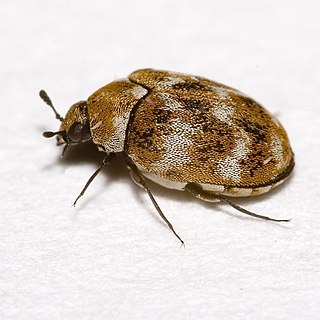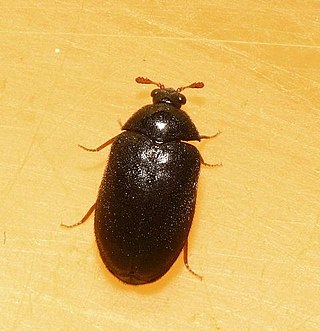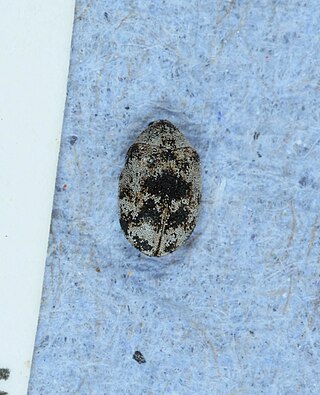
Anthrenus is a genus of beetles in the family Dermestidae, the skin beetles. One of several genera of carpet beetles, Anthrenus was historically placed in a subfamily Anthreninae, though presently included in the Megatominae. The genus Neoanthrenus is closely related.

Ctesias is a genus of beetles in the family Dermestidae, the skin beetles. They are distributed in the Palearctic, including Europe. There are about 23 species.

Anthrenus (Solskinus) sogdianus is a species of carpet beetle in the family Dermestidae. It is present in Central Asia. Based on current records, the species is known to inhabit mountainous regions situated from west to north of lake Issyk-Kul in Kyrgyzstan.

Anthrenodes is a subgenus of the genus Anthrenus of the subfamily Megatominae within the family of skin beetles. Subgenus is distinguished by antennae with 10 segments.

Anthrenops is a subgenus of the genus Anthrenus of the subfamily Megatominae within the family of skin beetles. Subgenus is distinguished by antennae with 9 segments.
Setapeacockia is a subgenus of the genus Anthrenus of the subfamily Megatominae within the family of skin beetles.

Helocerus is a subgenus of the genus Anthrenus of the subfamily Megatominae within the family of skin beetles. Subgenus is distinguished by antennae with 5 segments.

Peacockia is a subgenus of the genus Anthrenus of the subfamily Megatominae within the family of skin beetles. Only one African species is currently described.

Solskinus is a subgenus of the genus Anthrenus of the subfamily Megatominae within the family of skin beetles. Subgenus is distinguished by antennae with 7 segments.

Florilinus is a subgenus of the genus Anthrenus of the subfamily Megatominae within the family of skin beetles. Subgenus is distinguished by antennae with 8 segments.

Nathrenus is a subgenus of the genus Anthrenus of the subfamily Megatominae within the family of skin beetles. The most well-known species from the subgenus, varied carpet beetle, is distributed in most parts of the world, whereas the vast majority of other species are only present in regions of Africa and Asia.

Anthrenus is a subgenus of the genus Anthrenus of the subfamily Megatominae within the family of skin beetles.

Anthrenus picturatus is a species of carpet beetle in the family Dermestidae. The species is usually known from regions of Russia, Eastern Europe and Asia.

Anthrenus polonicus is a species of carpet beetle in the subgenus Helocerus of the genus Anthrenus, family Dermestidae. It is known from Belarus, Bulgaria, Czech Republic, Slovakia, "Yugoslavia", United Kingdom, Estonia, Germany, Hungary, Latvia, Russia, and Ukraine.

Anthrenus pimpinellae complex is a group of closely related species from subgenus Anthrenus. Most species that currently belong to the group were previously assigned as subspecies of Anthrenus pimpinellae.
Anthrenus alatauensis is a species of carpet beetle in the family Dermestidae. It is known from Kazakhstan and Kyrgyzstan.
Anthrenus medvedevi is a species of carpet beetle in the family Dermestidae. It is known from Kyrgyzstan.
Anthrenus (Solskinus) beali is a species of carpet beetle in the family Dermestidae. It is known from Kyrgyzstan.
Anthrenus (Solskinus) dsungaricus is a species of carpet beetle in the family Dermestidae. It is known from Eastern Kazakhstan and Kyrgyzstan. Records indicate the species is found in the hills north of Lake Issyk-Kul in Kyrgyzstan.
Anthrenus (Nathrenus) gorki is a species of carpet beetle found in Azerbaijan, Greece, and Turkey.












